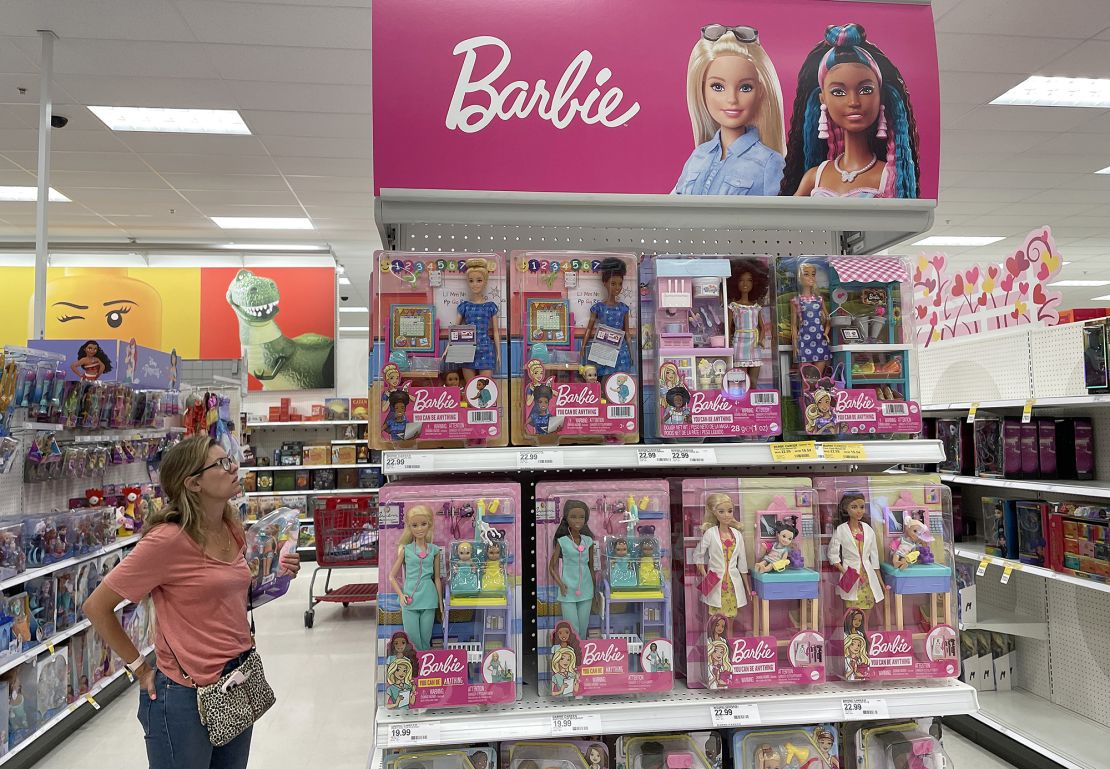New York
CNN
—
America’s highest-profile retail chains are walking a difficult tightrope — trying to blunt the financial hit from tariffs by raising prices for consumers without angering them or President Donald Trump.
Walmart, Target and Home Depot are recent examples of how companies are struggling to navigate raising prices because of Trump’s tariffs. Companies say the trade levies will increase their costs. But Corporate America has to learn to speak a new language — one that informs shareholders and customers about the effects from tariffs while avoiding reaction from Trump on social media or a threat from him or his administration to punish or investigate a company.
The three big-box chains will all take a hit from the global trade war. Around 40% of Walmart’s merchandise is imported, while roughly half of Target’s and Home Depot’s products come from overseas. The chains are all likely to change suppliers, absorb higher costs, raise prices or cut products to handle tariffs. But the similarity ends there: Despite using a similar toolbox to minimize the impact, each company has communicated about the impact of tariffs in different ways in recent quarterly earnings calls.
Walmart, reporting earnings first, was outspoken about the trade war impact, saying higher tariffs will lead to higher consumer prices. That prompted a strong reaction from Trump, who said Walmart should “eat” the cost. Days later, Home Depot and Target tiptoed around price hikes from tariffs during their own earnings calls.
Some companies are more willing than others to speak out and risk blowback from Trump, retail analysts say.
“Companies understand that whatever they say will be heard by the administration and reacted to,” said Michael Baker, an analyst at D.A. Davidson. “Walmart, because of their size and importance to the US consumer, may have a little more leverage and credibility to take a more aggressive posture. It makes sense for other companies to keep a little bit of a lower profile.”
Price decisions are highly sensitive. Mistakes can break a company’s reputation with consumers or crush their business. Companies are also struggling to make price decisions with tariff rates in constant flux.
But the White House has been on the attack over those decisions. Trump first took aim at Amazon last month following a report that it was considering displaying the added costs of tariffs on some items. Trump escalated it by placing an angry call to founder and Trump donor Jeff Bezos.
Trump then threatened toymaker Mattel with a 100% tariff after its CEO warned that tariffs would increase toy prices in the US.
“We’ll put a 100% tariff on his toys, and he won’t sell one toy in the United States, and that’s their biggest market,” Trump said of the company’s CEO Ynon Kreiz. “I wouldn’t wanna have him as an executive too long.”
So when Walmart last week said tariffs would bring pain for consumers, there was already risk of a backlash.
“We will do our best to keep our prices as low as possible. But given the magnitude of the tariffs, even at the reduced levels announced this week, we aren’t able to absorb all the pressure given the reality of narrow retail margins,” Walmart CEO Doug McMillon said last week on an earnings call.
Walmart tried to thread the needle by applauding the Trump administration for bringing down tariff levels on China to 30% from 145%.
Still, “the higher tariffs will result in higher prices,” McMillon said.
A source familiar with Walmart’s decision, who spoke under the condition of anonymity because they were not authorized to speak publicly, said Walmart had considered that Trump would react to executives’ comments. But Walmart had both a fiduciary obligation to investors to explain how tariffs would play out and also wanted to make sure customers would not think it was profiteering off tariffs, this person said.
McMillon, who has developed a cordial relationship with Trump through meetings at Mar-a-Lago and several mutual friends, has been candid with the president about tariffs in the past. Last month, at a meeting of retail CEOs at the White House, McMillon told Trump that the trade war with China had already started to disrupt the supply chain and would only intensify by summer.
Still, Trump criticized Walmart after McMillon’s public comments.
“Walmart should STOP trying to blame Tariffs as the reason for raising prices throughout the chain,” Trump said on Truth Social. “Between Walmart and China they should, as is said, “EAT THE TARIFFS,” and not charge valued customers ANYTHING. I’ll be watching, and so will your customers!!!”
But it’s harder for Walmart, whose motto is “everyday low prices,” to eat the tariffs than other companies without jeopardizing its brand image, said Scott Bisang, a partner at Collected Strategies, a communications firm.
“Walmart’s positioning is always around price with consumers,” Bisang said.
Home Depot and Target, whose brands don’t revolve around having the lowest prices, chose not to follow Walmart’s approach.

They both said there would be little impact on their prices from tariffs. But the reality is not so simple. Home Depot may raise prices on some items, while lowering them on others, and Target said raising prices was a “last resort.”
“We don’t see broad-based price increases for our customers at all going forward,” Home Depot executive Billy Bastek said on an earnings call with analysts Tuesday. “There are items that we have that could potentially be impacted from a tariff that, candidly, we won’t have going forward.”
Home Depot also believes tariffs are an opportunity for the company. It’s betting that holding prices down will help it gain market share against competitors, Bastek said.
Target CEO Brian Cornell warned Wednesday of “massive potential costs” from tariffs, but said the retailer could offset them by diversifying suppliers, adjusting products and hiking prices, if necessary.
“We have many levers to use in mitigating the impact of tariffs and price is the very last resort,” he said. “Our strategy is to remain price competitive by leveraging the capabilities, long-standing relationships and the scale that set us apart.”
Rather than blaming price increases specifically on tariffs, business advisers are encouraging companies to talk about a range of forces impacting pricing decisions. They also say companies should take what’s known as a “portfolio approach” — raise prices on some items and lower them on others to mitigate tariffs.
“Customers may be attracted or retained by low prices on some items, allowing room for price increases on others,” said David Garfield, co-CEO of consulting firm AlixPartners.
As individual companies stand on the front line in the trade war, some are questioning the silence of lobbying groups who represent them.
The lack of a collective business response to Trump hampers companies’ ability to push back on tariffs and other issues that may hurt the economy, Jeffrey Sonnenfeld and Steven Tian at the Yale Chief Executive Leadership Institute said this week.
Sonnenfeld and Tian called on business lobbying groups to play a larger role in “catalyzing collective action.”
“Trump fears collective action and relies on pitting rivals against one another through a divide-and-conquer approach,” they said in a Time opinion piece. “When business groups stand by in passive inaction when individual CEOs get pummeled, they cede the moral and strategic imperative to Trump’s impulsive whims — ultimately leaving business leaders twisting in the wind.”

